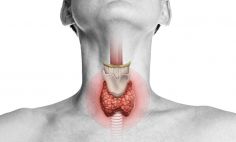Nearly five out of 100 Americans over the age of 12 have hypothyroidism, or an underactive thyroid. Because the condition is common, people often think they have hypothyroidism when they actually don't.
In fact, many symptoms that result from hypothyroidism can be caused by something unrelated. For instance, they can result from a medication, separate hormonal issue, or gastrointestinal disorder.
Symptoms of an underactive thyroid
- Fatigue
- Weight gain
- Feeling cold
- Joint and muscle pain
- Dry skin or hair
- Irregular menstrual periods
- Slower than usual heart rate
- Depression
Diagnosis
"Many patients refer to the internet for information related to their symptoms and incorrectly assume that these nonspecific symptoms indicate a thyroid problem," said Henry B. Burch, M.D., a program director at the National Institute of Diabetes and Digestive and Kidney Diseases.
The only accurate way to diagnose an underactive thyroid is to consult a doctor or other health professional. They will review your medical history and do a physical exam. Your doctor may also run blood tests and imaging tests. The tests will detect if your thyroid is underactive, and if so, why.
Treatment
Dr. Burch says people who are diagnosed with thyroid problems like hypothyroidism often find misinformation about treatment online too.
"Some patients come to their doctor's appointment with articles, books, or ads in hand or in mind, convinced that they are not receiving optimal care for their thyroid," he said.
An underactive thyroid is usually treated with a medication called levothyroxine. This medication replaces the hormones your body is missing if your thyroid is underactive. Levothyroxine, which is also known as T4, is converted in the body to a more active form known as T3. There is research underway to determine whether replacement therapy with levothyroxine alone can be improved by also providing T3, but the jury is still out on this question. Six to eight weeks after you begin taking thyroid hormone replacement therapy, the doctor will order new blood tests. The tests will indicate if the dose you are taking should be adjusted.
Dr. Burch encourages people who think they may have a thyroid issue to meet with their doctor. They should discuss their symptoms and get the appropriate tests. He said it's important to remember that the thyroid might not be the issue. Be open to the fact that if the thyroid lab test results are normal, the doctor will need to seek other causes for your symptoms.






